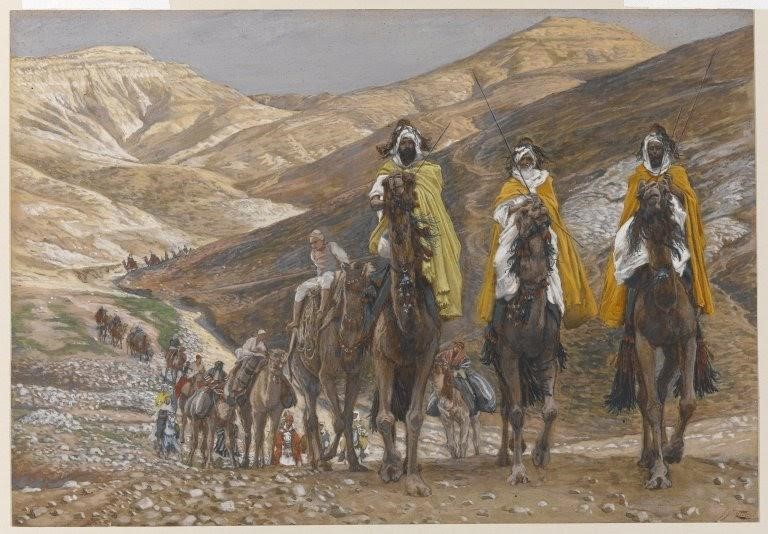
We work alongside Muslim scholars on most campuses. Bill Nelson, InterVarsity Graduate and Faculty Minister at Johns-Hopkins, shared an article with us arising out of his experience of sharing a Peace Feast with Muslim Students. This led to a study of the Genesis texts on Ishmael, how they have commonly framed, and how a closer look leads to a re-framing with implications for Muslim-Christian relations.
_____________________
In March 2020, we held our first Peace Feast with the Muslim Student Association (MSA) at the Johns Hopkins Medical campus. About fifty students —with equal proportions from the Hopkins Muslim and Christian communities —enjoyed a catered halal meal and made new friends. Over dinner, we spoke about our faith and shared from our hearts within table groups. Conversations continued long after we officially concluded. One Muslim friend commented afterward, “We have much religious strife in my country. However, tonight we have experienced welcome, hospitality, and peace.”
Following our event, I agreed to co-lead a follow-up interfaith dialogue with an MSA leader, focusing on Abraham and his sons. Afterward, I questioned our decision. I wondered if the Old Testament portrayal of Ishmael, Abraham’s first-born son, might offend our Muslim friends.
Most Arabs recognize Ishmael as their revered patriarch. Many non-Arab Muslims view themselves as Ishmael’s spiritual descendants. Muslims credit Ishmael with rebuilding the holy city of Mecca with his father, Abraham. Much of their sacred pilgrimage (hajj) ties symbolically to Ishmael, and his mother, Hagar.
A sabbatical and delays due to the pandemic gave me time to probe the biblical narratives of Ishmael more deeply. Surprisingly, I learned that the Bible contains some beautiful promises that God made to Hagar and Abraham concerning Ishmael. In applying this new understanding, I see God tearing down walls of prejudice and misunderstanding.
Ishmael: God Hears
[Trigger Warning: Survivors may feel traumatized by God commanding Hagar to return to the abusive home she had fled. Narrative prose should be interpreted descriptively, not prescriptively. Applications suggesting that God calls, for example, a battered wife to return and submit to her abusive husband are wholly unwarranted.]
Biblical references of Ishmael begin with God’s initial encounter with Hagar, his mother, in Genesis 16. Since Sarah is barren, she and her husband Abraham use Hagar as a surrogate mother to provide them a son. While pregnant, Hagar flees Sarah, her abusive slave-owner mistress.
The LORD finds Hagar —alone, afflicted, and humiliated —beside a remote, unnamed well in the desert. Unlike Abraham and Sarah, God addresses her by name. He begins with a question, thereby giving the powerless slave a voice. Later, he tells Hagar to return and submit to her mistress, armed with a promise. The LORD vows that Hagar will become the mother of a great multitude who will become a mighty nation. The son of this disempowered foreigner will be called Ishmael (literally God hears) because God has heard Hagar’s misery.
Ishmael: Wild and Free

Then the Lord foretells Ishmael’s future. The NIV translation of Genesis 16:12 reads:
“He will be a wild donkey of a man;
his hand will be against everyone
and everyone’s hand against him,
and he will live in hostility toward all his brothers.”
The wild donkey (onager) is the most horse-like of wild asses. They are also among the fastest mammals. Unlike most horses and donkeys, onagers have never been domesticated.
The LORD pictures the wild donkey (onager) as happy in freedom despite the cost of its liberty (Job 39:5-8). It freely roams the remote, arid desert (Job 39:6), endlessly searching for food (Job 39:8) while scorning civilization (Job 39:7).
To Hagar, a powerless slave, God promises Ishmael a powerful son. Hagar flees abuse; Ishmael does not back down. Hagar submits to her mistress; Ishmael is subject to no one – he is neither harnessed nor tamed. By day, Ishmael freely roams the wilderness as a wild donkey. At night, he erects his tent under the unparalleled beauty of the star-studded desert sky.
Ishmael Framed
Bible teachers often use the Genesis 16:12 prophecy about Ishmael as a springboard to cast Hagar’s son and his descendants as wild, hostile, violent, and fiercely anti-social.[1] They frequently use Ishmael as an ungodly example.[2] Below is a sampling from esteemed biblical scholars:
- “Ishmael is to be a wild ass of the steppe land. This designation is derogatory and derisive.”[3]
- “The descendants of Ishmael, in their hostility to the descendants of Israel, belong to the seed of the Serpent.”[4]
- “Even today Arab descendants of Ishmael are in dispute with their neighbours who have descended from Isaac and manifest a rugged independence which makes co-operation with anyone uncertain and precarious.”[5]
- “Ishmael will antagonize those who serve the one, true God. He will be wild, continually at odds with all those around him, especially his kinsmen (the sons of Isaac).’ Islam, perhaps the greatest religious enemy of the church in our day, holds Ishmael in high esteem.”[6]
These statements reflect the presumption of respected evangelical scholars that those who identify with Ishmael oppose peace.
Their negative perceptions are reflected within the broader Christian community. Recent polling by the Institute for Social Policy and Understanding (ISPU) suggests that most Muslims have favorable or neutral views of evangelical Christians, but the feeling is not mutual.[7] White evangelicals score the highest — and Jews the lowest — on the National Islamophobia Index, developed by ISPU in partnership with Georgetown University. In addition, Pew Research in 2017 identified white evangelicals as the most likely to support broad travel restrictions on several countries with large Arab and Muslim populations.[8]
If Ishmael represents such a threat, why does God picture him as an herbivore which chews on plants? Why not use a carnivorous animal that tears apart flesh instead? If the LORD’s portrayal of Ishmael’s future is so disparaging, why does Hagar effusively praise him as the God who sees me in response? Why does her story spread so widely that people name the well where she met the LORD, Beer Lahai Roi (the spring of the living one who sees me)? Why does the LORD name her son God Hears? Why does Hagar return and submit to her abusive mistress without protest?
Next week, Bill Nelson will explore these questions and propose a counter-narrative from scripture that reframes how Ishmael has traditionally been understood and the implications this has for present-day Muslim-Christian relations.
____________________
[1] A google search of “the spirit of Ishmael” shows multiple examples.
[2] Commentators frequently reference Galatians 4:29, “At that time the son born according to the flesh (referring to Ishmael) persecuted the son born by the power of the Spirit (Isaac),” as suggestive of Ishmael’s hostile nature. However, the broader context shows that Paul is speaking allegorically. Paul himself says: “These things may be taken figuratively” (v 24). A google search of “the spirit of Ishmael” shows multiple examples.
[3] Hamilton, Victor P. The Book of Genesis: Chapters 1-17, Eerdmans Publishing Co, 1990, p. 454.
[4] Waltke, Bruce K. Genesis: A Commentary, Zondervan, 2003, p. 297.
[5] Baldwin, Joyce G. The Message of Genesis 12-50, InterVarsity Press, 1986, p. 59.
[6] Sproul, R.C. “The Lord Has Listened,” TableTalk Ligonier Ministries, September 2006. https://tabletalkmagazine.com/daily-study/2006/09/lord-has-listened/
[7] https://www.ispu.org/american-muslim-poll-2019-full-report/
[8] https://www.pewresearch.org/fact-tank/2017/02/27/most-white-evangelicals-approve-of-trump-travel-prohibition-and-express-concerns-about-extremism/
Postscript: Peace Feasts are helping groups across the country grow witnessing relationships with Muslims. Peace Feasts are about heart-level dialogue: Muslims and Christians get together in small groups, share a meal, and discuss faith and life. Visit https://tiny.cc/peace-feast to learn more about how to organize Peace Feasts.

God has privileged Bill Nelson to represent Him among students and scholars gathered from over 50 nations at Johns Hopkins University over the past 25 years. Bill is an ordained minister through the Evangelical Free Church of America (EFCA), having received his theological and ministry training at Dallas and Gordon-Conwell Theological Seminaries. He and his wife Michele enjoy hiking in the mountains and other activities with friends and family, including their three grown children.

Great Article, Can’t wait for next week!